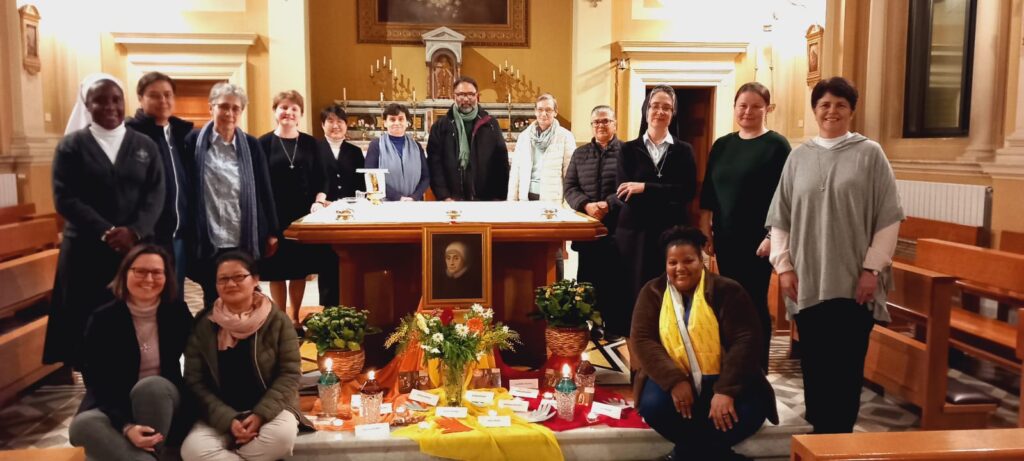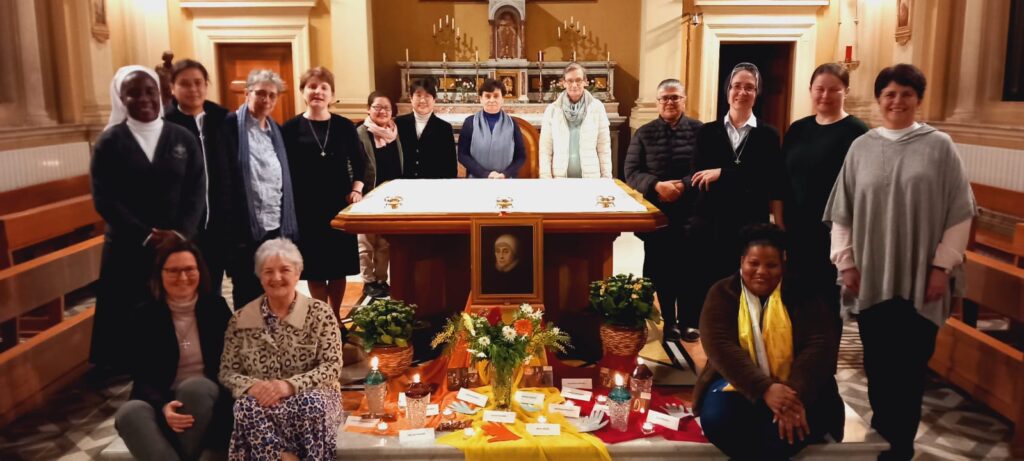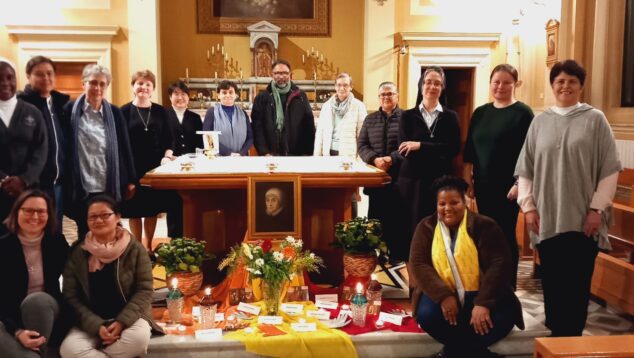On the feast of the Venerable Mary Ward, the sisters in Via Nomentana celebrated a Mary Ward Service with P. Jeera SJ. We share his homily:

“Prophets and epoch changing persons are not born every day. Venerable Mary Ward is one among them who was born in the fag end of the 16th Century (23/01/1585) and lived until the middle of the 17th Century (30/01/1645) in Yorkshire, England during a time of Catholic persecution.
Inspired by the deep faith of her family and her own personal foundational experience (Glory Vision at the age of 24 in 1609), Mary joined a Poor Clare Community in St. Omer in Northern France. However, soon it became clear to her that she was called to follow Christ in a ‘new way’, free from cloistered religious life. This led her to found an active religious women’s congregation in the Church, the Institute of the Blessed Virgin Mary, known in Ireland and throughout the world as Loreto Sisters.
This foundress, of a new way of being religious in the 17th Century, was met with stiff opposition from the male dominated hierarchical Church. Her works were suppressed and she was imprisoned. However, the pathbreaking initiative of a courageous woman could not be kept suppressed for a long period of time.
Mary Ward was formally recognized as the founder of the two religious institutes by the Holy See in 1909. In 2002, the Congregation of Jesus was finally allowed to adopt the constitutions of the Jesuits, as well as the name Mary Ward had originally intended for them.
Each foundress has a foundational experience, an inspiring source of strength which compels her to do something extraordinary. Mary too had her foundational experience. Drawing inspiration from this source of strength, she dared to venture into paths which were rarely trodden before. Thus, a new charism of being women religious was born. Opposition to and suppression of this new initiative was not surprising, but rather expected.
Based on her foundational experience she introduced a particular charism for being women religious. And now, you are the present followers of this charism. Today, when we are celebrating the feast of the Venerable Mary Ward, we need to ask ourselves: do we really follow her charism? What should we do to make sure to follow the charism handed over to us down these centuries?
I feel whenever, the charism of a foundress is being institutionalized into a Congregation, and followers from different parts of the world become members of it, there is a fair chance, during this process, over the years, the original charism being diluted or being interpreted differently. In this situation what should we do for being faithful to the pathbreaking charism of our foundress?
For answering this question let us look at the life of the Mary Ward itself. What did she do? She took conscious, continuous and courageous small and big decisions to actualize her foundational experience. This helped her to initiate a new charism of being women religious in the 17th Century.
I feel we also need to take conscious, continuous, and courageous decisions to follow the founding Charism as its present followers so as to experience it and to develop it further.
Why Conscious? First of all, we need to become aware of the context and the grace that the foundress received during her time. Each one need to experience this Charism in her personal life and align the same with the personal vocation one has received. Only then that person can be fully incorporated into the body of this Institute which has embodied the Charism of its foundress. If one has not experienced consciously the Charism of the foundress, one cannot be fully incorporated into the Institute. Such people tend to leave the Institute citing frivolous reasons. Hence, it is important to provide person oriented initial and ongoing formation to each member to become deeply rooted in the foundational experience of the foundress. This would help each member to become conscious of the vocation one has received and become grateful to God for the gift of her vocation.
Why Continuous? Secondly, this decision to follow a particular Charism need to be taken on a continuous way. It is not achieved in one day or within a short period of time. It should become an ongoing process. Because our adherence to a particular Charism is going to affect each small and big decision that we take on a daily basis. Our in-depth experience of the charism should challenge us to take life promoting decisions on a continuous way. If our Charism experience is not nurtured by personal prayer, communitarian faith sharing and ongoing formation our initial fervor will die down gradually and we become uncreative and unproductive religious. Based on the foundational experience we need to continuously reinterpret our course of actions in the modern time. Otherwise, we will become irrelevant in the modern times.
Why Courageous? Thirdly, the decision that Mary Ward took was counter-cultural and against the existing hierarchical prescriptions on religious life of her time. She found the grace of courage from her foundational experience and hence she was able to face the oppositions came on her way. It was not easy for her. But her indomitable courage prompted her to move forward with conviction challenging the then existing unjust structures of Church and society. We are not invited to repeat what she did in her times rather we are invited to take courageous decisions relevant to the modern times. It is not in repeating what the foundress did in her times makes us relevant today. Rather we are called to take courageous decisions that would help us to proactively respond to the present context. This would help us to reimagine and reinvent the charism according to the present time.
So, dear Sisters, during this feast of the Venerable Mary Ward, let us ask for the grace for making conscious, continuous and courageous decisions so as to reimagine and reinvent the Charism of Mary Ward relevant for the present times.”










